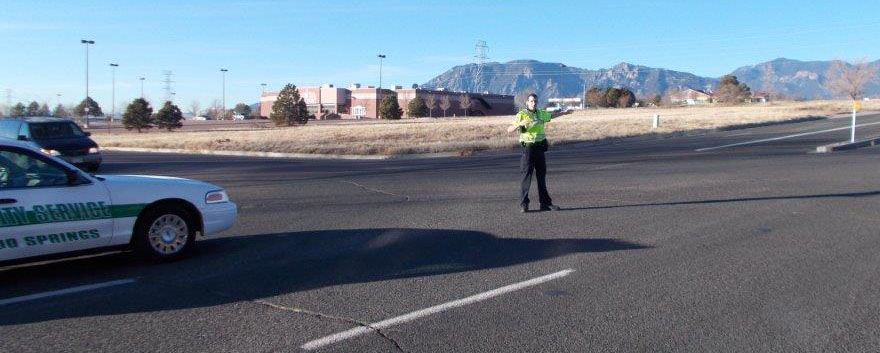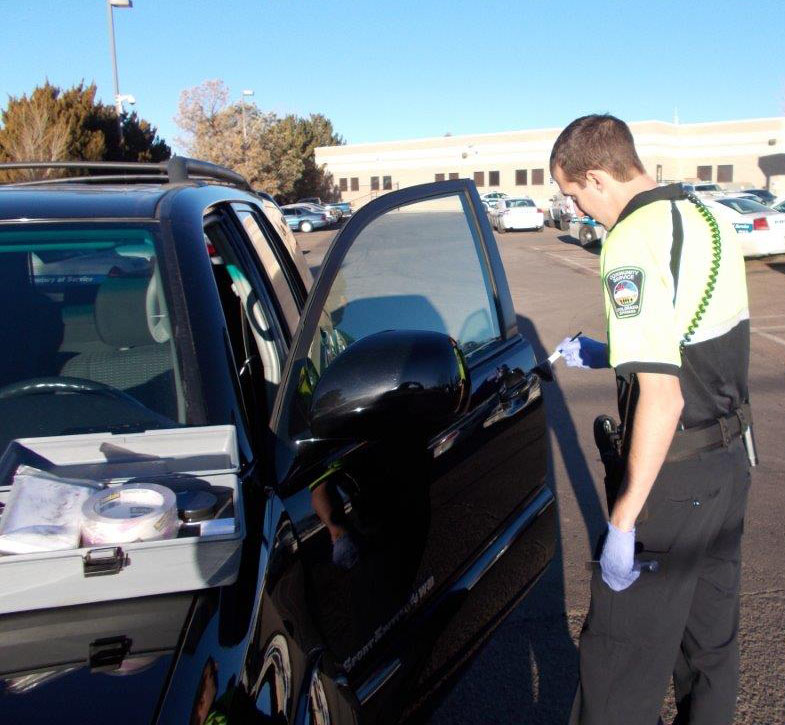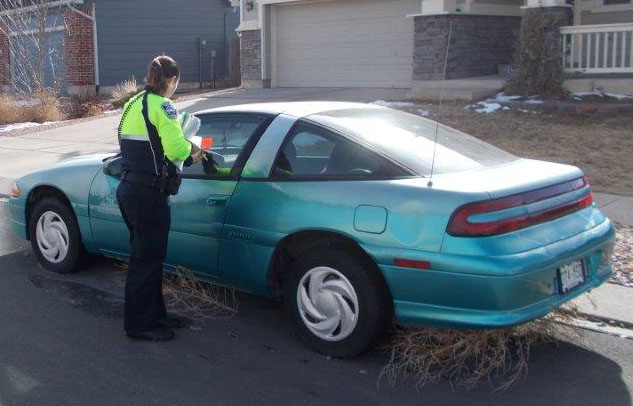Colorado Springs Police Department CSO Program
 The Colorado Springs Police Department (CSPD) has long viewed civilianization as a path to maintaining or improving services at a lower cost. Civilianization within CSPD has also been a way of increasing specialized knowledge and enhancing organizational effectiveness. CSPD civilians perform functions such as crime scene investigations, forensic interviews of children, staffing public areas of police facilities, research and planning, dispatch, crime analysis, evidence handling, maintaining records, and code enforcement.
The Colorado Springs Police Department (CSPD) has long viewed civilianization as a path to maintaining or improving services at a lower cost. Civilianization within CSPD has also been a way of increasing specialized knowledge and enhancing organizational effectiveness. CSPD civilians perform functions such as crime scene investigations, forensic interviews of children, staffing public areas of police facilities, research and planning, dispatch, crime analysis, evidence handling, maintaining records, and code enforcement.
Due to the economic downturn, CSPD started to reduce full-time positions in 2009 and developed an alternate response model to calls for service. This model included a number of calls for service that would no longer receive an in-person response from an officer. Instead, these calls would be referred for telephone or internet reporting. Unfortunately, due to the reduction in sworn personnel, proactive policing activities also decreased during this time. The department began to receive feedback from the community that its “new normal” way of doing business was not responsive to community needs.
 CSPD researched successful Community Service Officer (CSO) programs in other communities and developed a plan for building a CSO program in the city of Colorado Springs. Due to funding constraints, the program was piloted using federal Recovery Act funding to hire just two CSOs. The program has expanded significantly since those first two grant-funded CSOs, with eight full-time and 16 part-time CSOs in 2013. These CSOs responded to 18,462 calls for service resulting in 6,339 reports last year. In doing so, CSOs have improved responsiveness to citizen calls for service and freed up sworn officer time. CSOs respond to a number of different types of calls for service, but never respond to a call in progress because of safety concerns. The types of calls for service to which CSOs respond include theft (including motor vehicle theft), burglary, graffiti, harassment, and abandoned vehicles. Specifically, traffic accidents are one call for service that really illustrates how CSOs can assist in managing the call for service workload. Traffic accidents in Colorado Springs require more than one police unit about 70 percent of the time. With CSOs working as the second unit in these accidents, CSPD estimates that 200 hours of officer time can be freed up each week. CSOs also assist neighborhood problem-solving efforts through their work to address quality of life issues such as abandoned vehicles. In 2014, the program again expanded to include eight full-time and 32 part-time CSOs. In the future, CSPD plans for CSOs to expand into crime prevention efforts.
CSPD researched successful Community Service Officer (CSO) programs in other communities and developed a plan for building a CSO program in the city of Colorado Springs. Due to funding constraints, the program was piloted using federal Recovery Act funding to hire just two CSOs. The program has expanded significantly since those first two grant-funded CSOs, with eight full-time and 16 part-time CSOs in 2013. These CSOs responded to 18,462 calls for service resulting in 6,339 reports last year. In doing so, CSOs have improved responsiveness to citizen calls for service and freed up sworn officer time. CSOs respond to a number of different types of calls for service, but never respond to a call in progress because of safety concerns. The types of calls for service to which CSOs respond include theft (including motor vehicle theft), burglary, graffiti, harassment, and abandoned vehicles. Specifically, traffic accidents are one call for service that really illustrates how CSOs can assist in managing the call for service workload. Traffic accidents in Colorado Springs require more than one police unit about 70 percent of the time. With CSOs working as the second unit in these accidents, CSPD estimates that 200 hours of officer time can be freed up each week. CSOs also assist neighborhood problem-solving efforts through their work to address quality of life issues such as abandoned vehicles. In 2014, the program again expanded to include eight full-time and 32 part-time CSOs. In the future, CSPD plans for CSOs to expand into crime prevention efforts.
In addition to plans to increase the sworn workforce, the expansion of the CSOs program helps achieve a model for effective patrol services at CSPD (see Figure 1).

The CSO program has also shown benefits in other areas. Civilians from our volunteer program have been successfully hired as CSOs; 20 percent of the CSOs hired by CSPD were volunteers. CSPD has also hired one police officer from its part-time CSO cadre.
The CSO program has been embraced by sworn officers, and CSOs are seen as valued team members. CSPD anticipated some initial resistance from the community when a CSO responded to a call for service rather than a “real” officer; however, CSPD has found CSOs have been welcomed by citizens as well.
 Because of the success of the CSO program, CSPD has created a Civilian Criminal Investigator (CCI) position for investigative units. CCI perform a number of functions, including reviewing unsolved cases and following up on potential investigative leads, submitting forensic evidence for processing, conducting interviews, and testifying in court. These investigators must have five years of law enforcement experience in investigations. In 2014, CSPD will have seven CCIs in its Investigations Division. These investigators will be assigned to cold case homicide and missing persons investigations, financial crimes, adult sexual assault and domestic violence investigations, crimes and against children and runaways. Additionally, a CCI will be assigned to the Vice, Narcotics, and Intelligence Division to support human trafficking investigations. CSPD also created a civilian investigator position in the Regional Explosives Unit.
Because of the success of the CSO program, CSPD has created a Civilian Criminal Investigator (CCI) position for investigative units. CCI perform a number of functions, including reviewing unsolved cases and following up on potential investigative leads, submitting forensic evidence for processing, conducting interviews, and testifying in court. These investigators must have five years of law enforcement experience in investigations. In 2014, CSPD will have seven CCIs in its Investigations Division. These investigators will be assigned to cold case homicide and missing persons investigations, financial crimes, adult sexual assault and domestic violence investigations, crimes and against children and runaways. Additionally, a CCI will be assigned to the Vice, Narcotics, and Intelligence Division to support human trafficking investigations. CSPD also created a civilian investigator position in the Regional Explosives Unit.
CSPD’s civilianization efforts have been valuable to the department and the community, allowing for a continuance of effective delivery of police services in light of tightening budgets.
Deputy Chief Mark Smith, CSPD Patrol Bureau
Amanda Terrell-Orr, CSPD Planning and Grants Administrator
Preventing Multiple Casualty Violence | CrimeStat IV | Modern-Day Slavery and CP | Colorado Springs CSO Program | Law Enforcement and Communities of Color | Hero911 App | 2014 Sutin Award | National Center for Building Community Trust and Justice | 2014 CPD Coming Soon!
